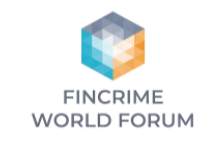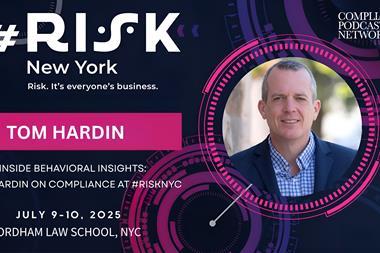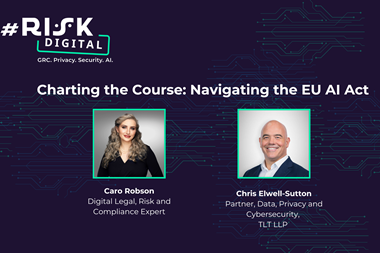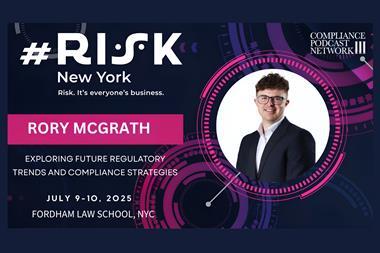Transcription:
Robert Bateman:
(Music).
Hello. Welcome back to FinCrime Focus: Anti Money Laundering. I am Robert Bateman, Head of Content here at GRC World Forums and your host for the remainder of this morning.
Before we get into our next session, just a reminder that you can register for additional sessions using the menu bar on your left. You can view those sessions on demand if you can’t watch them live.
And I’d also encourage you to please carry on asking questions. We had some great questions for the previous panel; always good to see that audience involvement.
So our next session is Outlook for FinCrime, Fraud and AML in 2022: What You Need To Know. It’s hosted by Andrew Dalip, who is attorney at law and consultant at Maeson Chambers. I’ll hand over to Andrew now.
Andrew Dalip:
Thank you, Robert, and good morning, good afternoon, and good evening to our audience all around the world today, and welcome to this GRC World Forums event, Outlook for FinCrime, Fraud and AML in 2022: What You Need To Know.
My name is Andrew Dalip and I’m based in Trinidad and Tobago in the Caribbean and I’ll be your moderator for today’s panel.
Today we are privileged to have with us two experts in the compliance field, Mr. Shawki Ahwash, who is based in Lebanon, Beirut, and Mr. Robert Williams, based in New York in the United States.
So can I invite you both to tell the audience just a little bit more about your backgrounds, starting with you, Shawki?
Shawki Ahwash:
Yeah. Good morning, good afternoon, everybody. I’m really happy to be joining one of GRC events and to be sharing virtual stages with my colleague Robert and the good moderation of Andrew.
I’m based out of Lebanon. I am a career banker, anti financial crime professional with 15 plus years of experience in banking, spanning wire transfer investigation, correspondent banking, trade finance, investigative queries with correspondents. And the last eight years were concentrated within the anti financial crime space as [inaudible 00:02:59] Head of AML & Sanction Division at my current employer.
Alongside my banking career, I’m also a lecturer trainer with ACAMS, Union of Arab Banks, Governance Dynamics, United Arab Emirates, Romanian Banking Institute, and have participated in several consultancy training workshops across East Africa, like Ethiopia, Iraq, also in the GCC and MENA, Qatar, Cyprus.
And I am a certified anti money laundering specialist from ACAMS, and certified global sanctions specialist, also from ACAMS.
Again, I teach one of the courses accredited by the Chartered Institute for Security and Investment London, which covers the whole remit of the Financial Conduct Authority and National Crime Agency in terms of anti financial crime.
And happy to be here with you today.
Andrew Dalip:
Fantastic. Thank you so much, Shawki.
And over to you, Robert.
Robert, I think you’re still on mute.
Robert Williams:
Can you hear me?
Andrew Dalip:
There you go now.
Shawki Ahwash:
Yes.
Robert Williams:
Yes. Robert Williams here. I have about 20 years experience starting with a couple of French banks. I was at Crédit Lyonnais, Credit Agricole, and then BNP. I was the compliance officer. And finally, at Standard Charter Bank, sort of an SME.
After the pandemic, I decided to try and pivot to crypto. I still have CAMS, but I have two crypto certifications. One I obtained in June of ’21, more law enforcement based, and one in March of 2021. And at the moment, I’m trying to leverage my anti money laundering and compliance skills to move to the crypto world. It’s very exciting.
And I enjoy doing these. This is probably my sixth or seventh one. I’m doing one live actually in the city next week with another outfit.
And there we go.
Andrew Dalip:
Great. Thank you so much, Robert. I think we’re all going to benefit from both of your vast experience.
So today’s topic saves us from having to look into the crystal ball and asks our panel to give some insight into the AML space over the 2022 year.
Now, to set some context, I think that the threat landscape in 2022 will continue to be driven by two main factors. First, we’re going to continue to feel the after effects of the global pandemic, with supply chain disruptions fueling black markets and catalyzing criminal activity, including online fraud and other cyber crimes.
The second driver, of course, is the war in Ukraine. The compliance community is of course focused on sanctions against Russia, but sanctions should not be our only concern. The war will catalyze other types of criminal activity, ranging from trafficking of weapons and people to corruption, as Russia will try to exploit vulnerable countries to keep its own economy and the war going.
So there is quite a bit to unpack from today’s team, and the US, is, of course, a major player in the global AML and sanctions landscape. So Robert, can you share some perspectives and insights on these areas from where you sit?
Robert Williams:
Sure.
Well, there’s a couple of things going on in the sanctions space; unprecedented collaboration. I don’t think there’s any secret that the Western world, the UK, EU, New Zealand, Australia have all joined together to sanction Russia to try and stop the goings on. It’s even gone so far as Ukraine obtaining money via crypto for military aid and for just feeding their people.
We have the AML Act on the agenda, we have FinCEN and SARs. It’s going to be a very busy year. There’s some FATF stuff going on.
The AML Act is probably the most important. Finally, they’re going to talk to the beneficial ownership, which I don’t, for the life of me …
If the audience is not aware, for instance, Delaware, there’s an old saying that it’s harder to get a library card than it is to set up a company in Delaware. And you don’t have to tell them who the beneficial owner is. So I don’t know if it’s the lobbyists that don’t let it happen, but …
No, it’s going to be a very interesting year. There was even something posted yesterday, and it was on LinkedIn, about it was the 32nd birthday of FinCEN. It was sort of a biting comment about they’ve done nothing, the US, through the years. And I couldn’t necessarily disagree with the gentleman, it’s just the way he put it out there, but we definitely have to change to detect and to stop some of these illicit goings on.
And I think that’s what might have pushed me a little bit more to the crypto world, because it seems you can get them faster, the bad guys.
Andrew Dalip:
Great. Thank you, Robert.
So I know you’ve mentioned the AML Act, Robert, and we have seen that the extra territorial reach of the US system means that issues like implementation of that legislation should be [crosstalk 00:09:28] all of us in the rest of the world.
So Shawki, can I invite you to wade in on these issues, particularly from the perspective of someone from the Middle Eastern North Africa region, and how you see them impacting on the rest of the world?
Shawki Ahwash:
Yeah, definitely, Andrew.
You know, the extra territorial or the long arm reach of US regulation, by virtue of their strength and enormity, they affect financial institutions across the globe when they amend or regulate or put into effect a new regulation. And the AML Act, which is known as the Anti Money Laundering Act 2020, has made or introduced sweeping reforms to The Bank Secrecy Act, which was, I guess, issued in 1986. And also, it changed a lot the US Patriot Act, which was the talk of the town in the post September 11 attacks.
So now we are talking about a new era, a new kind of due diligence, a new kind of being compliant when you do business, especially when you maintain a business interest in the US, or when you maintain a correspondent account or a [Nostro 00:10:56] account in the United States.
And practically speaking, let me just walk you through the main features of the AML Act that FI within the MENA and GCC region should be cautious about.
First, there has been an introduction of a whistle blowing program that is so impactful in terms of sharing information and letting people speak out about any financial crime incident.
Of course, when we talk about whistle blowing, we are talking about disclosing something in good faith, not just for the sake of revenge or ruining the reputation of someone. It should be in good faith.
And this whistle blowing program works as the first line of defense. We know well, as compliance officers, that a compliance program mainly is comprised of three elements or three pillars, which is the first line, which are the business people, the second line, which we represent as compliance professionals, and the third line, which is the internal audit function.
Now, by doing so, the AML Act is introducing a whistle blowing program. And above all, it is incentivizing people to speak up by paying also rewards. So there is a monetary reward for everyone that may disclose something about illicit flows or criminal actors.
Second, there is a subpoena or court order privilege, which can be done in combination or in cooperation between the US Treasury and the Department of Justice, where, when a foreign bank sends any kind of transaction, like a letter of credit, a SWIFT payment to the US correspondent, and there is kind of suspicion around this payment, there is now more leverage for the US financial institutions to subpoena this spend for a money laundering concern.
And also, the subpoena may permeate beyond the bank itself and go to its subsidiary if the client issuing the payment or ordering the payment has multiple accounts in subsidiary and affiliate companies of this particular bank.
So we are having a 360 degree kind of vigilance that the US financial institutions are trying to make. And the measures can be from blocking the amount or seizing the account or closing the account. And so, de-risking the bank all together from the US market.
So these are the main features that have been introduced to the US Patriot Act and The Bank Secrecy Act under the AML.
Andrew Dalip:
Thank you, Shawki. You’ve given us a lot to think about there in terms of how far the US jurisdiction reaches.
Insofar as the rest of the world, essentially, is leveraged to comply, how do you think that financial institutions need to align their AML [inaudible 00:14:53] policies based on these new US regulatory requirements?
Shawki Ahwash:
Basically, Andrew, banks are good at trying out policies, but what I am afraid of is keeping these policies in the drawer and not aligning them to the internal controls and the controls that should be in their core systems and also in their compliance solutions they implement.
You know, it’s of great success when you let your compliance solution talk to your core system and how you migrate the data and you don’t miss any [inaudible 00:15:38], whether on the transaction monitoring level or the sanction screening level.
So what they should do, they should, first of all, check their data. The more reliable the data, the more reliable the alerts; the more reliable the alerts, the better quality of SDRs.
As Robert has mentioned before me, there is now a great spotlight on the SDR filing, and we don’t want to encourage our peers and colleagues to just file defensive SDRs, we call on them to file quality SDRs, where the predicate offense may be clear to the regulator, which will help feed in the FIU database for better sharing with the judicial body for better prosecution, for better arrest of bad actors.
Second, the sanction screening should be well calibrated in terms of the updating of the list, so you get as low as possible the number of false positive, which may be tedious in compliance officers to discount. So you try to strike the right balance between true positive and false positive when you are screening against a sanctioned entity.
Also, on the KYC level, you need to delve and scratch below the surface when you identify your customer and your counterparty, or the customer, if you like, or the supplier of your customer, so you avoid secondary US sanction that may cost you a lot when the correspondent may flag a payment for you.
So by combining these due diligence measures, financial institutions may, to a great extent, be able to mitigate compliance risk. And the list goes on and on.
We can talk about good training, you can talk about skilled compliance teams that stay always ahead of the curve, think like a criminal, and the governance which come along from the board of directors in maintaining a robust compliance culture.
I will stop here so I don’t take my colleague’s time.
→SEE ALSO: FinCrime World Forum
Part of the Digital Trust Europe Series - will take place through May, June & July 2022, visiting five major cities;
Brussels | Stockholm | London | Dublin | Amsterdam
Get to the edge of the financial crime debate at FinCrime World Forum.
Andrew Dalip:
I’m sorry. I was muted.
Shawki, I think you’ve given us a lot to think about. And I think it’s important for us to appreciate that it’s not just financial institutions, it’s also DNFBPs, but now, more so, [inaudible 00:18:41] service providers.
And Rob, I think we need to tap into some of that vast experience you have in the crypto world. And I’ll go to one of the first questions that we’ve had from the audience.
Robert Williams:
Okay.
Andrew Dalip:
“Any thoughts with regard to the tension between data privacy protection regulations and the use of blockchain in an effort to facilitate AML?”
Robert Williams:
I’m sorry, can you just repeat that?
Andrew Dalip:
Certainly. The question asks, “Any thoughts with regard to the tension between data privacy protection regulations and the use of blockchain in an effort to facilitate AML?”
Robert Williams:
That is something that I haven’t actually been involved with just yet. I know that data privacy is more … In the US, I think it’s mainly California that has the data privacy rules. The UK has it mostly. So unfortunately, I haven’t really followed that. So we can maybe come back to that.
Andrew Dalip:
Certainly. I think we can. But we will also take the opportunity while you have the mic to get some further insights.
So I remember reading that there’s been some mention of countries pivoting towards accepting virtual assets like Bitcoin as legal tender.
Robert Williams:
Yes.
Andrew Dalip:
Do you think you can tell us a little bit more on this issue?
Robert Williams:
Well, as we know, last June, I believe it was El Salvador announced that they were going to have Bitcoin as legal tender. And just a few weeks ago, in April, I think it was the 26th, CAR, the Central African Republic announced … And if the world doesn’t know, or the audience doesn’t know, they’re in bad shape, the Central African Republic, between wars and famine.
And I don’t want to say that crypto is … It seems to be, with the last two, countries are trying to use it, but the public is not as accepting as you would’ve thought. And I don’t know that it’s a last ditch effort, Andrew and Shawki, I don’t know if you know, to try and keep their economy going, besides that and the IMF help and other countries trying to help them out. I don’t want to put a spear through it right away and put it down right away, but I hope that works out for them, the Central African Republic.
Andrew Dalip:
Robert, I think it’s quite interesting that you mentioned the Central African Republic, and the fact that they are actually a vulnerable country.
Now, we know that Russia, for example, has also tried to increase its influence in West Africa over the last decade, including the Central African Republic and other countries like Mali, which are gold producing states. So we may, of course, be looking at gold being a source of funding for Russia and its economy and the war coming out of Africa. And this opens, of course, the doorway to issues such as gold laundering, mixing the illegal gold with the legal gold market, to hide Russia’s involvement.
Robert, do you see any scope for the intersection between markets like the illegal gold trade and cryptocurrency abuse in the context of the situation in places like Central Africa?
Robert Williams:
It’s perfect timing because I am actually on an editorial board of ACSS. It’s another sanctions group. And I’ve just finished writing a paper on that.
There was a thing called, I think it’s PSMJ or PMSJ, Precious Metals and Jewelry, that FinCEN came out with. It was mainly against Russia, and then there was also a consortium of different countries to battle Russia’s sanctions of [inaudible 00:22:53] using gold. I mean, I don’t think there’s any secret that Russia has a, pun intended, a ton of gold, and you can use it in money laundering and trade finance. There’s ways around it.
The physical gold is a hard thing, obviously, but they’re doing it with sort of like black market members, the Black Market Peso Exchange, with crypto versus gold. And it’s not a good thing that they’re trying to get away with. And in some ways, they might even have gotten away with it already.
Just like North Korea has to get money to continue their nefarious activity with nuclear weapons, Russia is doing it both to continue to have funds for the war against the Ukraine and just to pay their own military that, from what I’m reading, the ones that get drafted are not very happy to be in.
Andrew Dalip:
Robert, I think that your contribution has been very insightful. You’ve mentioned the confluence of a lot of different issues in the AML space, you spoke about the crypto issues, you’ve spoken about trade based money laundering, sanctions, and illegal gold trade.
And Shawki, we recognize that the MENA region has become a growing market for the gold trade, but also has now positioned itself as a leader in international trade, particularly in the region.
Any insights from your perspective on these issues that Robert already mentioned; the illegal gold trade, trade based money laundering?
Shawki Ahwash:
Yeah. But before this, if you allow me, Andrew, just to comment on what has Rob said, which is very important, regarding the gold trade. And this may bring us also to talk a little bit about designated non-financial business and professions, or what we call as DNBPs, which have become under all jurisdictions as reporting entities.
One of them, which is more front and center, is the dealers in precious matters. And if we look back at, let’s say, the FATF evaluation of the UAE lately, we know that the UAE is now on the grey list, which is not a big deal, but there is a message to be learned from this.
There has been some kind of deficiency in how the UAE manage DNFBPs, and specially dealers in precious metals and gold.
You know, gold has an intrinsic value, and it can be shipped and transported in different shapes; it can be melted down, it can be worn as something ornamental or jewelry. So gold is very attractive to bad actors and to rogue nations or nations that come under US or other multi-lateral sanctions.
And we know the proximity of UAE maybe to Iran has made the international assessors more scrutinizing how you manage your designated non-financial businesses and professions.
So yes, these entities should be more serious about abiding by AML [inaudible 00:27:09] regulation in terms of reporting, document retention and knowing their customers, and of course, filing SDR when needed.
Now back to your question regarding trade based money laundering or international trade, especially in this critical time of US and multi-lateral sanctions against Russia, which is a huge exporting country.
Of course, the stakes are high, the risks are high. TBML risk can be yet mitigated, despite the fact that trade finance activity are still so much document intensive, document centric, that you may have the challenge of automating.
That’s why we always advise compliance professionals and officers working within the trade finance space to never screen the parties of the LC on the onset, and later on, forget to rescreen. Because the LC passes through several phases, and some amendments may be done to the port offloading, to the port of discharge, to the manufacturing.
Also, they should also try to secure that the bill offloadings can be authenticated by professional bureaus and bodies across the globe which are professionals in trying to validate that there is a shipment going on and not a phantom or fake shipment.
Also, another challenge, Andrew, is the unstructured form of the SWIFT messages for the letter of credit. You know, the SWIFT message type that maybe many bankers are familiar with, which is the message type 700, has a lot of narrative that is typed, and they are not specific fields with specific coding.
This also puts another onus on banks in trying to read between the lines and have advanced screening tools to try to detect keywords in terms of sanction evasion, and therefore, they should carry out very strict and high end sanction screening.
Also, I may refer also to an [inaudible 00:30:10] guidance about petroleum shipping that was rolled out a couple of years ago, but it’s still pertinent to our day now, about how ships may do ship to ship transfer in the open seas to avoid reporting to sanction ports, and how they may use a neutral jurisdiction to avoid sanctions.
For example, I want to export to Iran; I do the first step by exporting the goods to Belgium, which is a neutral country. That may give confidence to the underlying parties or banks. Then from Belgium, I try to reach a sanctioned country like Iran or Syria.
So there has been lot of talk about how you may disable your GPS positioning, how you may transfer the goods in the open sea, how you may manipulate the name of the vessel when you screen. That’s why you always try to screen by the IMO, or International Maritime Organization, number, which is like the plate number of the car rather than the brand of the car. Because usually, no one can change the IMO number, but they can change the name of the vessel to avoid being caught on the sanctions.
Andrew Dalip:
Shawki, these are excellent points, and I’m glad you went into such detail on the [inaudible 00:31:49] issues, because especially with the situation in Russia right now, we are seeing a proliferation of those types of practices; the switching off of [inaudible 00:31:58] systems to avoid Russian sanctions.
So it’s an area I think we have to focus on a lot more, on the trade-based issues, the maritime domain, whether we’re talking about sanctions division, whether we’re talking about trade based money laundering, or the predicate offenses that are related.
And bridging the two topics you spoke about, you highlighted the point that we can’t just be looking at financial institutions, we need to be looking at the whole range of DNFBPs as well, because the compliance community has been focusing on FIs for a very long time, so we’re pretty good at that, but DNFBPs is one of the areas that FATF, for example, [inaudible 00:32:36] pulling down on.
And you touched on the grey list. Trinidad and Tobago, my country, was able to get off of the grey list a couple years ago, and I was proud to be part of that process, but I’m going to use the opportunity to segue way across to that FATF issue right now.
So I know Robert had mentioned FATF already in the conversation, and quite recently, the FATF has published [inaudible 00:32:58] publications which has given us some clearer insight in terms of how it proposes to treat with the next round of mutual evaluations, the fifth round, which is going to be upon us very soon, starting in 2025.
They’re going to be looking for a quicker turn around in terms of these mutual evaluation reports. And countries, particularly listed businesses and financial institutions, are going to see a lot more emphasis by supervisors to ensure that they report on time and they demonstrate all the components of their compliance programs, both on the money laundering and on the sanctions compliance side.
So Robert, so far, you have mentioned the FATF earlier in the conversation. What signals from the FATF do you think the compliance community would need to zero in on in the short term, particularly in preparation for the next round of mutual evaluations?
Robert Williams:
Well, the main one would be, I think we spoke of, is FATF 15, which deals with … I’m going to pass it back to Shawki. What was the FATF 15 again? Or Andrew. It’s just jumped out of my head. FATF 15?
Andrew Dalip:
[crosstalk 00:34:20] providers.
So Recommendation 15 deals with new technologies.
Robert Williams:
New technologies. Oh, that’s right. Well, that’s the crypto stuff. Okay. That’s it. That’s right. I should have known that. Yes.
So the danger of the new technologies; all this stuff is just very new to everyone, and so FATF is trying to get all the ducks in a row.
Anything new, I guess, has the tendency to … You have to make sure you have the rules and regulations. So FATF wants to ensure that the global sanction regimes and AML regimes are all set up and have the right procedures and screenings and policies and procedures, like I said, in place to enhance and to be all set.
And to your point, Shawki, about the NBFIs, Non-Bank Financial Institutions, that’s been going on for years. For the life of me, I don’t know why they haven’t made more like that in the attorneys.
One of my first SARs I did back in, I think, 2001, it was one Latvian bank and just an address in Nevada. So I don’t know. You know, that was just a lawyer that had set up hundreds and hundreds of companies.
So like I say, for the life of me, I don’t know why the NBFIs have not been talked about more, and more enhanced and scrutinized, but there you go.
Andrew Dalip:
Great. Thank you so much, Rob.
And Shawki, you did mention that the UAE is on the grey list, and we’ve seen on LinkedIn and in other forums that the UAE has been taking a lot of initiatives, have been very aggressive in terms of addressing the FATF deficiencies, but it should be a learning experience for us.
So what lessons do you think that the global community needs to take in terms of what’s happening in the FATF space now and preparing for the immediate future?
Shawki Ahwash:
Yeah. When talking about FATF and FATF recommendations, which have been around, I guess, since the early nineties, I guess we have to look back at the latest development that happened under the FATF umbrella, which was the exit of the executive secretary David Lewis, which I guess the FATF was so wise to understand the message.
You know, a person like David Lewis is known for his professionalism and being strict about implementing, whether on the technical prong or the effective prong, the FATF recommendation. And he spoke it up and said that there is some real problems in addressing and implementing the FATF recommendation.
So as a follower and as a compliance professional, when I follow the new FATF publication, the new FATF approach, I see a kind of new blood in the FATF outlook and how it’s assessing jurisdiction.
There is some kind of revision for the approach, and this is very promising in mitigating financial crime risk across the globe, and also in protecting the integrity of the financial community.
Now, since we talked about UAE, I mean, being a huge country and a business hub like the UAE, I’m not worried about the UAE on the grey list, and I’m sure they’re going to be out of the grey list soon.
Why? Because ahead of the result, there has been very serious steps taken by the Central Bank of UAE against deficiencies within financial institutions, whether on the KYC level or on the sanction screening level. And there has been heavy penalties levied upon banks within the United Arab Emirates.
So given this firm step taken by the FATF, banks should do another step [inaudible 00:39:46] by enhancing their measures, by being more serious about implementing AML CFT measures, because it has been proven that, when you are on the grey list, you are going to be denied some portion of direct investment and investors may go elsewhere. And when a country, especially developing countries, lose some kind of foreign direct investment, this may affect the GDP as a whole, the macroeconomic landscape as a whole, nd this may also open the way for illicit finance to dominate and become more flourishing.
Andrew Dalip:
Thanks, Shawki, I think that’s really insightful. And that experience from the UAE in terms of how they’ve been addressing the FATF [inaudible 00:40:44] does put a spotlight on FATF’s transition from focusing primarily on technical compliance, whether you have the laws in place to [inaudible 00:40:54] effectiveness in terms of implementation, and that translating all the way down from the national levels, which are regulators, to your FIs and your DNFBPs.
Now, in terms of effectiveness, we have an excellent question coming from the audience, and I’m going to kick this one back to both of you.
So the question asks, “To what degree do you foresee the Financial Action Task Force taking more assertive steps in encouraging data sharing among leading FIs to combat AML CFT?
And Robert, maybe I can kick it across to you initially, because we know that the Americans have the [inaudible 00:41:31] provisions under your legislation, which allows for sharing.
So do you think that the FATF is going to further encourage that level of cooperation?
Robert Williams:
Sure.
Yes. Actually in January of ’22, FinCEN announced an NPRM, which of course we know is the Notice Proposed Rule Making, for a program to actually share SARs more across the foreign counterparts in terrorist financing.
I don’t know why this hasn’t been done before. It’s obviously more beneficial to know what’s going on around the world. And I know that there’s all sorts of … We go back to the privacy laws and this or that, and you go back to even local police versus FBI versus this; “I want to be the hero. I want to catch the bad guys.” Just catch the bad guys, is my feeling.
Even the acting director [inaudible 00:42:41], they’re pushing it and pushing it and pushing it. He even spoke before the house, the US Congress, I think, just last week, and they had him on the spot.
And I think that, versus the previous administration, I have a little note in front of me here, the Biden administration for this or for that, you know, complaints about getting things done, from the financial crime side, there is enumerable plans, programs, initiatives, whatever you want to call them, to fight this scourge, more than I’ve ever seen in my 20 years.
I don’t know if that’s the same thing you see, Shawki. I’ll pass it to you.
Andrew Dalip:
Shawki, from your perspective, do you see the FATF encouraging more of these types of cooperation, like the [inaudible 00:43:48], for example, [inaudible 00:43:49] in the UK? What are your thoughts?
Shawki Ahwash:
Basically, there has been lot of initiatives around the world, starting from the US, and also under the Financial Action Task Force, what they call the PPP, or Private Public Partnership, but still … I mean, maybe in the US, the laws may permit this, but I guess it’s still much easier said than done, because this kind of cooperation always stumbles with privacy law and bank secrecy law.
So if I am a financial institution X, and I share the common customer of financial institution Y, and I have suspicion around this guy, but that does not qualify for an SDR, still there is no official channels, or unofficial channels even, to let the other financial institution know about the concern that I have as a preemptive way to carry out the due diligence by the financial institution Y.
But I guess as we go, I guess we are going to see this going from an [inaudible 00:45:08] or immature stage to a more mature stage as we go, because this helps a financial institution, law enforcement, as well as regulator to preempt financial crime.
And you know, in financial crime, and I’m sure Rob agrees with me, the timeliness factor or the speed is a basic factor in making financial crime not happening.
So this is what I can say in this sphere.
Yet I also would make one step back and just reiterate, but in a different way, what Rob said about the BRO. If we look at the curve, Andrew, we see the curve going up for BRO importance and the public registry of BRO. And this is what was the FATF guidance about; uniting your public registry, having the beneficial ownership of the entities in one place and having legitimate access to these guys who owns legal entities when needed to know if there is corruption, if there is illicit financing, if there are what we call opaque ownership structures trying to hide illicit proceeds.
So BRO is also gaining more and more momentum.
Andrew Dalip:
Yeah, I think you’re absolutely correct, Shawki, and I think Robert would’ve kicked off that conversation when he steered us towards the situation in Delaware [crosstalk 00:47:01] continue to focus on that area. They’ve been doing a lot of work on Recommendation 24, perhaps Recommendation 25 in terms of transparency of ownership of legal arrangements as well, and we may see a lot more focus on Immediate Outcome 5 in terms of effectiveness as the FATF shifts its focus across to effectiveness.
Well, the fact of the matter is that there’s never enough time for these conversations, especially when you have two brilliant presenters as we’ve had today. So I’m going to take this opportunity to thank both of our presenters for sharing their insights with us today.
And ladies and gentlemen, thank you so much for making this event a success. We look forward to you joining us for the next GRC World Forums FinCrime event, and please have a fantastic day.
Shawki Ahwash:
Thank you.
Robert Williams:
Thanks, gents.
Robert Bateman:
Thanks so much to Andrew and the panel there. A fascinating discussion, so much going on in this space. And thanks for joining us today, for trying to stay abreast of all the developments in FinCrime and anti-money laundering.
Coming up next, we have a session from one of our sponsors, BioCatch; how behavior is solving a growing money mules problem. This will be a really interesting presentation. This company is doing a lot of interesting work in this space. So please join-
FinCrime World Forum
Part of the Digital Trust Europe Series - will take place through May, June & July 2022, visiting five major cities;
Brussels | Stockholm | London | Dublin | Amsterdam
Get to the edge of the financial crime debate at FinCrime World Forum.
FinCrime World Forum is a two-day in-person event taking place as part of the Digital Trust Europe series. The event will feature presentations and panels from thought-leaders and anti-financial crime professionals that are leading the way on how we can better, more efficiently and more effectively fight financial crime.

Outlook for FinCrime, Fraud and AML in 2022: What You Need To Know

With financial institutions still reeling from Brexit and COVID, the Russian invasion of Ukraine has added unprecedented complexity into an already uncertain financial crime landscape.
 Currently
reading
Currently
reading
Outlook for FinCrime, Fraud and AML in 2022: What You Need To Know
- 2
- 3



























No comments yet